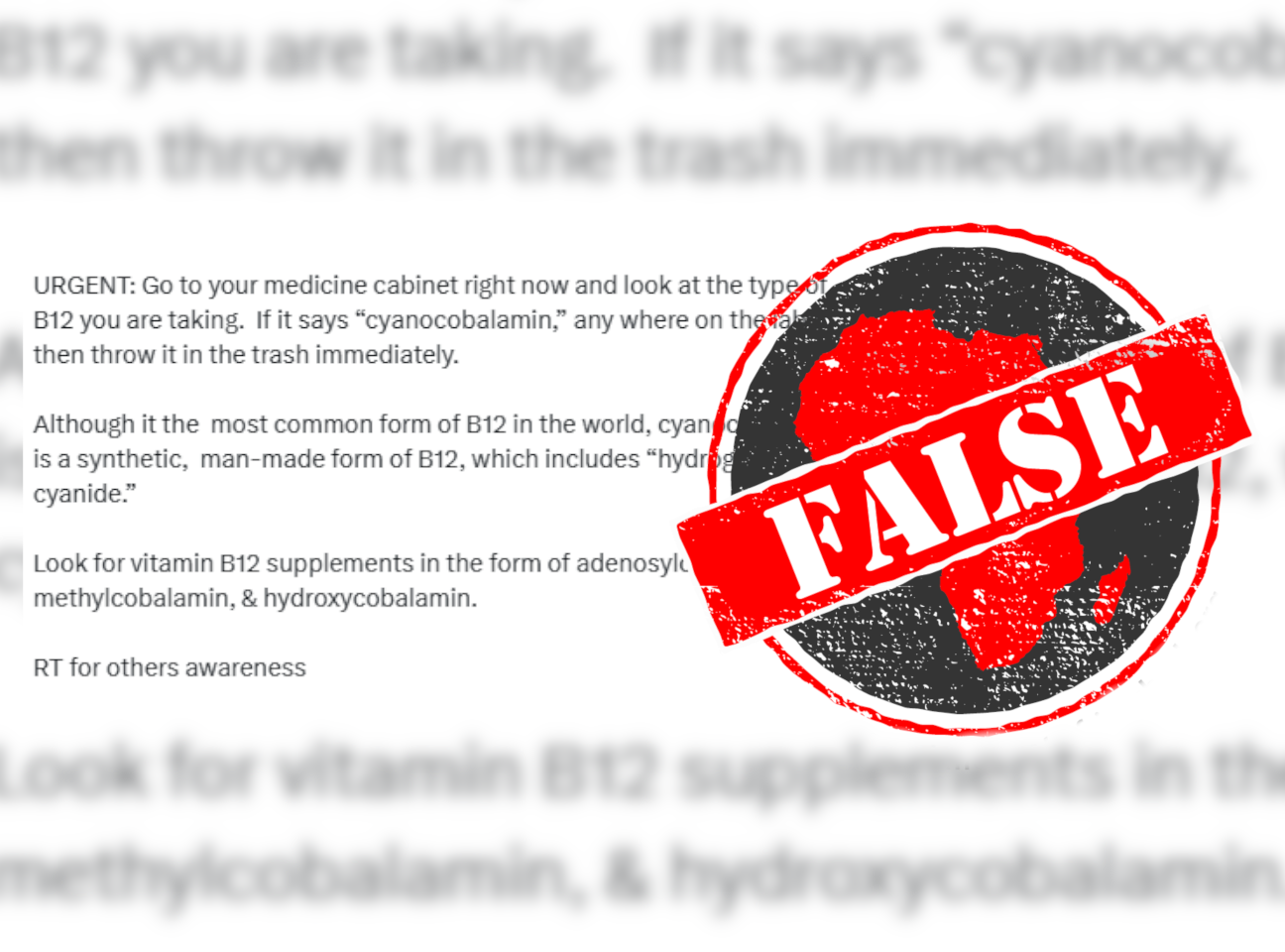IN SHORT: Many social media posts advise people to throw out vitamin B12 in the form of cyanocobalamin, often warning that it contains cyanide. But this common supplement has been extensively studied and is safe to use, unless you have kidney disease and take extremely large doses. Speak to your doctor if you are uncertain.
A number of posts, circulating on social media since November 2023, warn against consuming a particular form of vitamin B12 called cyanocobalamin.
Some versions of the claim have garnered substantial engagement, like this one on the social media platform X, formerly known as Twitter, by someone claiming to be a medical doctor. It has been viewed over 5.7 million times and reposted 8,600 times.
Facebook pages promoting alternative medicine have made the same claim here and here, and it’s been discussed in videos here and here. It was also posted here, here and here.
In this video, two people discuss the use of the ingredient in supplements, with one saying it’s “absolutely false” that cyanocobalamin isn’t toxic or dangerous.
We investigated whether cyanocobalamin is really something you need to avoid.

The what, where and how of vitamin B12
Vitamin B12 is essential for our bodies. It helps form red blood cells, produces DNA and serves other vital functions.
Vitamin B12 is found in meat, fish and dairy products, and so vegetarians and vegans are particularly vulnerable to B12 deficiencies. According to Harvard University School of Public Health, vitamin B complex supplements can help people with deficiencies feel more energised by treating their anaemia, but “there is no evidence of benefit if people without a deficiency take extra B vitamins”.
The physician who made the claim prominently on X, Dr Dennis Walker, is careful to point out in their bio that tweets are not intended to be used as medical advice.
Despite this, the post about cyanocobalamin instructs: “URGENT: Go to your medicine cabinet right now and look at the type of B12 you are taking. If it says ‘cyanocobalamin,’ any where on the label, then throw it in the trash immediately.” It also asks readers to retweet “for others awareness”.
Walker says to “Look for vitamin B12 supplements in the form of adenosylcobalamin, methylcobalamin, & hydroxycobalamin”. His website, linked to in his X bio, includes advertising for “natural” vitamin B12 supplements.
According to the US’s National Institutes of Health (NIH), vitamin B12 supplements are most commonly in the form of cyanocobalamin but are also found as adenosylcobalamin, methylcobalamin and hydroxycobalamin. These forms are similar, the NIH says, and “research has not shown that any form of supplemental vitamin B12 is better than the others”.
The UK’s National Health Service says cyanocobalamin is a “manufactured version of vitamin B12” that is used to treat and prevent complications from vitamin B12 deficiencies.
Cyanide in your supplements?
Many of the posts claim cyanocobalamin is dangerous because it contains cyanide. One video, which advises the public to throw away anything containing cyanocobalamin, is captioned: “The same thing, we make chemical weapons from, we make vitamins from.”
In another video clip, a speaker claims: “Anything that says cyanide, you should just … Red flag.”
Cyanide is a chemical that is toxic to humans in large doses. It disrupts the body’s ability to use oxygen and can quickly be deadly or cause significant long-term health effects, according to the US Centers for Disease Control.
But the well-worn expression “the dose makes the poison” is important to remember here. In small quantities, even something like cyanide is not harmful to human health. Cyanide naturally occurs in various common foods, such as almonds, soy, spinach and cassava.
McGill University’s Office for Science and Society explained the science behind this cyanide panic in supplements: “Even at the highest doses, the amount of cyanide released is about 20-40 micrograms which is far less than the amount of naturally occurring cyanide to which one could be exposed by consuming flax seeds, unpasteurized almond milk, fresh apple juice or apricots”.
This means “there is no reason to worry about cyanide in vitamin B12 supplements”. The safety of cyanocobalamin has been established for most people, and is supported by evidence from various trusted medical research sources.
Kidney disease and side effects
Some research suggests that if people whose kidneys do not function properly take very large doses of cyanocobalamin, this can lead to cyanide build-up in the body. To be on the safe side, people with kidney problems are advised to use another form of vitamin B12.
But lots of substances should be used with caution by people with kidney problems, including “natural” remedies such as nettle or licorice root.
“Natural” does not necessarily mean safe, and “manufactured” does not mean dangerous. Just about all medicines and supplements, including cyanocobalamin, can produce side effects, and this is true whether they are found in nature or synthesised in a laboratory. Since cyanocobalamin is the most widely used form of vitamin B12, researchers would know if it caused major side effects or problems for most people.
If you are unsure about whether you should use vitamin B12 supplements or are worried about supplement health effects, speak to your doctor. But don’t throw out your cyanocobalamin unnecessarily.
Republish our content for free
For publishers: what to do if your post is rated false
A fact-checker has rated your Facebook or Instagram post as “false”, “altered”, “partly false” or “missing context”. This could have serious consequences. What do you do?
Click on our guide for the steps you should follow.
Publishers guideAfrica Check teams up with Facebook
Africa Check is a partner in Meta's third-party fact-checking programme to help stop the spread of false information on social media.
The content we rate as “false” will be downgraded on Facebook and Instagram. This means fewer people will see it.
You can also help identify false information on Facebook. This guide explains how.


Add new comment